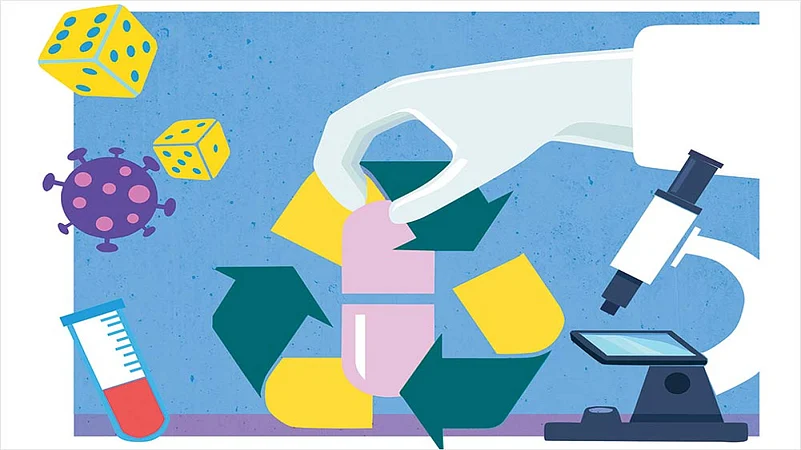Comprehensive clinical trials of repurposed drugs—existing medicines reused for the treatment of diseases they were originally not meant to cure—on COVID-19 patients have established that none of them has any positive benefits. About half-a-dozen drugs, manufactured to treat various other diseases, were initially claimed to be effective for Covid patients on the basis of clinical trials. For instance, a study in France on 30 patients provided early evidence of hydroxychloroquine (HCQ) as an effective medicine to shorten the duration of Covid infection in patients. Primarily meant to prevent and treat malaria as well as for rheumatoid arthritis, HCQ emerged as a repurposed drug to provide protection and early recovery from Covid. This prompted governments in India and other countries to include HCQ in the treatment protocol.
Gradually, more existing medicines such as remdesivir, lopinavir, interferon, tocilizumab and dexamethasone showed positive results in clinical trials for Covid patients. India’s health ministry included all of them in its treatment protocol even though not a single trial has been conducted in the country to ascertain the effectiveness of any repurposed drug. Now, comprehensive clinical trials on these medicines have started contradicting the initial findings.
Two important studies were a solidarity trial conducted by the World Health Organization (WHO) on four drugs—remdesivir, HCQ, lopinavir, interferon—and another on tocilizumab published in the New England Journal of Medicine. The WHO trial was conducted for six months in 30 countries, including India, in more than 400 hospitals on over 11,000 patients. The trial concluded that the four drugs “appeared to have little or no effect on hospitalised Covid patients, as indicated by the overall mortality, initiation of ventilation and duration of hospital stay”. “The mortality findings contain most of the randomised evidence on remdesivir and interferon, and are consistent with a meta-analysis of mortality in all major trials,” it further says.
| Drugs | original use |
| Remdesivir | Hepatitis C, respiratory syncytial virus (RSV) |
| Hydroxychloroquine | Malaria, rheumatoid arthritis etc |
| Lopinavir or ritonavir HIV | infections |
| Interferon | Cancer and viral infection |
| Tocilizumab | Rheumatoid arthritis |
The other study, conducted on 243 patients, showed that tocilizumab, which was allowed to be administered to Covid patients in India in May, was ineffective for any mortality benefits in moderately ill, hospitalised patients. An earlier trial conducted in July had also thrown up similar findings.
Should the government prohibit use of repurposed medicines?
With the lack of any independent India-specific study, health experts base their opinion on various other factors to support or dispute their arguments for repurposed drugs. As the government was prompt in introducing these medicines on the basis of foreign-based trials claiming positive results, some experts are asking why those decisions are not being reversed after extensive trials have established the contrary.
“The evidence certainly is not in favour of continuing these drugs, particularly HCQ and lopinavir,” says Ramanan Laxminarayan, director of the US-based Center for Disease Dynamics, Economics and Policy. According to Dr Rahul Bhargava, director, Department of Clinical Hematology and Bone Marrow Transplant, Fortis Hospital, Gurgaon, under the current treatment norm for early recovery, a patient with a mild COVID-19 infection is required to get five to six doses of remdesivir, each costing around Rs 5,000. “If the trial in which India too was a participant shows that the drug has no benefits, what is stopping the government from prohibiting its use? On what basis are such drugs being used in treatment? If trials on foreign lands show their effectiveness, there are also bigger trials that show their futility,” says Dr Bhargava.
Some other experts, who support continuing treatment with these drugs, cite the actions of drug regulators in the US and Europe. For instance, despite the WHO solidarity trial, the US drugs regulator, Food and Drug Administration (FDA), approved remdesivir for the treatment of COVID-19 in a statement issued on October 23. The FDA said the drug is only to be administered in a hospital or in a healthcare setting capable of providing acute care comparable to in-patient hospital care. “This makes remdesivir the first definitive treatment drug for COVID-19 to receive FDA approval,” says Dr Sudhir Bhandari, principal and controller, SMS Medical College Hospital, Jaipur, one of the 400 hospitals that participated in the WHO solidarity trial. “For patients with severe infection, this approval gives hope that recovery would be effective and comprehensive, when administered and titrated at the opportune time.”
Dr Bhandari believes the outcome of the solidarity trial is erroneous. “The Rajasthan COVID-19 management protocol drafted by a team of experts from SMS Medical College Hospital and issued on October 17 by the health department, had recommended the use of remdesivir in moderate to severe illness (those on oxygen), to be started early in the course of therapy,” he says.
According to Laxminarayan, the FDA has likely based its decision on the limited efficacy of remdesivir recently reported in the New England Journal of Medicine. “Here, mortality was 6.7 per cent with remdesivir and 11.9 per cent with placebo at day 15, and 11.4 per cent with remdesivir and 15.2 per cent with placebo by day 29,” he adds. “The needs of regulators determining the utility of the drug in the US are different than that of a public health agency, which has to weigh other considerations, including broader benefits and costs of the drug, for the whole world.”
Can India afford clinical trials?
Experts say poor budgetary allocation on health is a major reason why India can’t afford to conduct its own clinical trials, and has to look to the West for results and solutions. “Ideally, such trials should have taken place in India and the clinical protocol framed on that basis, but this hasn’t happened,” says Dr Jugal Kishore, director, professor and head of department, community medicine, Vardhman Mahavir Medical College and Safdarjung Hospital, New Delhi. “To give you a rough idea, 1 per cent of the country’s total budget is allocated for the health sector and 1 per cent of that 1 per cent goes into medical research. How do you expect costly clinical trials with that budget? Moreover, pharma companies often sponsor the trials and always try to influence government health agencies and regulators.”
Emphasising the need for India’s own research and trials, Dr Kishore questions the WHO’s role, alleging it is not a credible body and works to further the interests of developed countries. The WHO has also courted controversy while issuing advisories during the pandemic—for example, in June, when it halted its trial on HCQ on the basis of a flawed report published in the medical journal Lancet.
Dr Vikas Bajpai, assistant professor, Centre for Social Medicine and Community Health, JNU, Delhi, suggests that the government should rely on indisputable facts and use its resources accordingly. “Instead of spending on procuring these drugs whose effectiveness is questionable, the government should spend on making masks and sanitisers available to the poor. While these medicines have a disputable result, masks and sanitisers are indisputable shields against Covid,” he says.
Outlook wrote to the Indian Council of Medical Research for their views on amendment of the treatment protocol, but got no response.


























